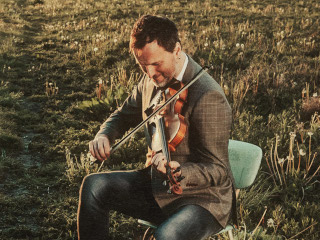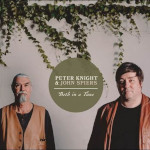

By the time John Spiers & Jon Boden had hung up their highly regarded hats as the Spiers & Boden duo in 2014 they had earned a place in the hearts of the folk audience that few could rival. Described by The Guardian as ‘the finest instrumental duo on the traditional scene’, Spiers & Boden first rocketed onto the music scene in 2001, quickly winning a clutch of BBC Radio 2 Folk Awards and going on to take the folk scene by storm. John and Jon were also founding members of the pioneering and hugely successful folk big band Bellowhead, whose stellar career increasingly came to dominate their time. But now, after exploring solo projects, the duo is back with a brand new 13 track album ‘Fallow Ground’.
The title ‘Fallow Ground’ is not only a reference to the duo’s choice to put Spiers & Boden to one side for a time, but also, to the huge impact that the pandemic has had on live music. The decision to return with an album in 2021 was made pre-pandemic and as a result ended up being recorded between lockdowns. It’s an album bursting with ideas as well as a new-found confidence to let the material speak for itself.
The songs and tunes selected for ‘Fallow Ground’ are overwhelmingly traditional – a clever mix of rambunctious melodies and contemplative ballads – and are the classic Spiers & Boden mixture of morris tunes, pieces brought back to the 21st century from dusty manuscripts and, of course, a rare ability to conjure their own remarkable tunes. A particular favourite of John Spiers is Funney Eye found in the 19th century manuscript of fiddler William Henry Giles of Bampton, Oxfordshire (of Bampton of morris fame). The tune was incomplete, so Spiers says he ‘used his intuition’ to finish it off.
Bluey Brink comes from the repertoire of Peter Bellamy and is the duo’s first foray into the world of Australian folk song. Butter and Cheese and All is also from Peter Bellamy, although this version is Sam Larner’s and is also known as “The Greasy Cook”, “The Cook’s Choice” or more intriguingly “Cupboard Love.” The title track, also known as “As I Stood under My Love’s Window” or more prosaically “The Cock,” is an unusual traditional love song in that it’s neither boasting of “conquest” nor is it lamenting betrayal or abandonment – everyone enjoyed themselves! There are also original tracks, such as Bailey Hill / Wittenham Clumps – the first tune written by Jon, the second by John, both about hills which mean something to them; Giant’s Waltz / The Ironing Board Hornpipe inspired by the Giant’s Causeway and The Fog (written by John).
'I guess we were looking for songs during lockdown with a sense of fun and light relief. I realise that there are zero songs about death on this album, which is probably a first and may get us expelled from the English Folk Dance & Song Society. Yes, traditional songs with a joyous edge'. Jon Boden. Spiers and Boden's Fallow Ground is released by Hudson Records on 17th September 2021 with a return to live touring.
Legendary long-term Steeleye Span fiddler Peter Knight and Bellowhead’s John Spiers have formed a formidable partnership with their improvised music – their second album is unveiled: ~Music of the unexpected…
In the summer of 2016, the organisers of the UK’s most easterly festival FolkEast had the inspired idea of pairing legendary musician Peter Knight and melodeon player extraordinaire, John Spiers for a special 'one off' concert at that year's festival. It ended up being a festival highlight, with no space left in the marquee and people standing five deep in pouring rain. For a few minutes at the close of their performance, with a standing ovation and roars for more, it didn't seem as though the audience was going to let them go. As the MC remarked, it was one of those occasions when people could say "I was there".

It was clear that leaving matters there was not an option, and plans were made to record an album (Well Met) and undertake a UK tour during spring 2018. Nearly four years later, the two perpetually busy giants of folk are about to return with their second studio album Both in a Tune – the apt title inspired by a line in Shakespeare’s As You Like It.
The 10-track release, produced by Knight and Spiers and mastered by Edward Blakeley, shows how the duo’s sound has evolved. Taking traditional tunes that may sound unremarkable in other hands, or improvising a box-fresh tune from the get-go, Knight & Spiers explore every facet and nuance, morphing and melding the music into something exploratory and extraordinary and taking listeners on a journey of striking singularity.
Knight’s reputation is peerless – his wholly distinctive wizardry having enriched the British music scene for more than four decades. Since his departure from folk-rock’s iconic Steeleye Span in 2013, he has turned his full attentions to the Gigspanner trio and Gigspanner Big Band, conjuring up a unique sound. London-born, but now living in south-west France, his career started when he won a place at the Royal Academy of Music and was immersed in classical music. Migrating from there through the vibrant Irish music scene of Sixties London he was later invited by Ashley Hutchings to join Steeleye Span, securing his place within the annals of British folk music. Introduced to the art of free improvisation through an encounter with world renowned jazz saxophonist Trevor Watts, it’s no surprise that on-the-spot invention runs through his genre-agnostic veins.
John Spiers meanwhile is known as one of the leading melodeon players of his generation and co-founder of the raucous Bellowhead behemoth that held sway over the scene for more than a decade - as well as his collaborations with Jon Boden and Jackie Oates and as a member of Knight’s Gigspanner Big Band. But his duo with Knight is the most freeform of all, a leap of faith producing something spontaneous and special. From a wellspring of British traditional folk tunes – and their own imaginations – the pair produce startling, eclectic and hypnotic arrangements that flirt through the genres and have no fixed destination.
Says Knight: “Since recording our first album, John and I have far more experience of playing together. With Both in a Tune I felt it was important to push the boundaries further, without forsaking the integrity of the tune itself. Combining my interest in folk music and free improvisation is not always easy, but I feel the endeavour is absolutely necessary for the world of music. It is probably more risky but I believe it’s a risk well worth taking.”
Spiers acknowledges that working with Knight has allowed him to develop a more exploratory side of his playing. “It’s something I have always had but rarely used in other bands and pairings so I am very grateful for the serendipity that brought us to work together. Because of the nature of the melodeon, I am both a soloist and an accompanist, a rhythm player and a melody player and I think that means I treat music as a whole rather than a series of parts. When you say ‘here’s a tune’ what does that really mean? Does it mean all the notes you heard someone play including all the ornamentation and feeling? Does it mean just the most important notes that would be written down in sheet music? Does it mean the harmonic structure and chord sequences? Or does it just mean the feeling you get from hearing or playing the piece of music?”
“Those questions are at the heart of Both in a Tune. I’m not sure I know the answers but I suspect the answer to all might be yes. Improvisation can be a loaded term but at its core it means staying open-minded and being playful when playing music. A lot of the material on the album is drawn from old sources which have been played time and again over the years. By playing them in this open way I feel we have really got inside them and distilled what it meant to us to be playing them at that particular moment in time - whether it’s allowing the strong melody to dominate, whether it’s just hinting at a whisper of the tune over a texture of emotion, or whether the only tune in the room is two musicians playing off each other.”

Knight’s fiddle totally “talks” as it dances, dips and dives around Spiers’ evocative melodeon in a constantly inventive palette of textures and rhythms - with magical meanders and unscheduled walkabouts taking the music in unorthodox directions. The opening track may come as something of a surprise. If you thought you knew tunes as ingrained in the folk fabric as Scarborough Fair, think again. The traditional English folk tune goes back to the Middle Ages, the fair of the title having started in the 14th century. It has been recorded multiple times by artists from Martin Carthy to Simon and Garfunkel. But Knight and Spiers delve deep and conjure something of acute sensitivity and melancholy – tremulous, wistful melodeon and sparse violin giving way to bolder brushstrokes, the rising melodic lines and counter melodies creating a captivating opener.
Says Peter: “Our take on Scarborough Fair was one of those experiences where the instruments sort of played themselves. We needed a few more tracks to complete the album and we picked a tune that we both knew but had never played together. The microphones were set up, we started playing, and there it was. A piece of music that we are both happy to have created together.”
Their eight minute interpretation of the pretty 18th century Scottish air Yellow Haired Laddy gently meanders like the ‘braes and burns’ of the song version before going ‘off road’ in more abstract mode and returning seamlessly to the main melody. A marching beat ushers in the strident Drone in D – something of a combative, interaction but the mood lightens for the melodeon-led Abbot’s Bromley Horn Dance. One of the oldest surviving medieval rituals in England, the dance dates back to 1226 and is performed annually in the Staffordshire village by six deer dancers, a fool, a bowman, a hobby horse and Maid Marian.
The dance theme continues, hopping over the channel to Peter’s adopted homeland for some lively instrumental interplay on his self-penned La Dance de Madame Meymerie, the fiddle playing cunning cat-and-mouse manoeuvres with the melodeon. The French folk dance diversion continues with Bourrée De Concours before the jaunty, carefree tune set Le Berger De Laleuf – Signposts.
Urgent, staccato fiddle opens the uncanny Improv 3 which does what it says on the can – a brilliant workout for Knight’s many and varied skills in a question and answer with the melodeon as the volume surges and then fades away to a quivering whisper. In the penultimate track Union the gentle melodeon melody rises and falls alongside Knight’s raindrop-like pizzicato and soothingly bowed fiddle – a Spiers-penned track of perfect ‘sweet spot’ harmony before the duo’s exploration of the brooding Battle of the Somme lament makes for an arresting and emotive finale.
The uncharted adventure is an immersive experience, with all the thrills of a ride on a ghost train that may not stop at any station. And there are no words. But with music as inventive, mercurial and fearless as this, who needs words?
Photo Credits:
(1)-(4) John Spiers & Jon Boden
(www.spiersandboden.com),
(5)-(6) Peter Knight,
(7) Gigspanner Big Band,
(8) Steeleye Span,
(9) Bellowhead
(unknown/website).